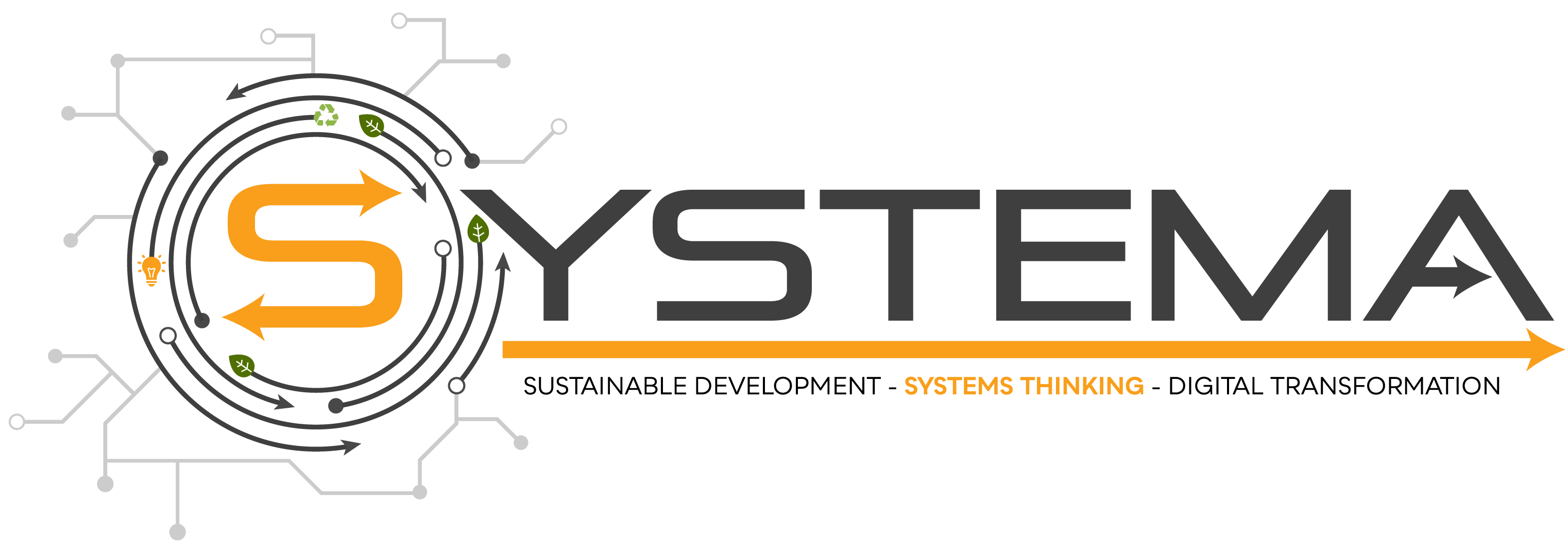SYSTEMA PROJECT - Systems Thinking can support educational institutions to provide the 21st century’s needed skills to the new generations
Abstract
This article will analyze how the SYSTEMA project can impact on youth education and training, by underlining how it can contribute to the growth of organizations dedicated to working in these fields. We will outline the formal and informal goals of the project and the potential benefits on training and education for the new generations.
Keywords: systems thinking, digital transformation, sustainable development, digital skills, soft skills, K12 education
Sustainable Development and Digital Transformation require new skills
Sustainable development is the key issue that is defining policymaking in the 21st century. This unavoidable fact was ratified in 20151 when the Sustainable Development Goals (SDGs) of the 2030 Agenda for Sustainable Development were adopted by 193 countries2.
However, designing and implementing successful sustainable policies is an extremely complex process, due in part to their intrinsic nature. Designing and implementing a sustainable policy means deepening the understanding of all the problems we are endeavoring to address. It means recognizing elements and processes that characterize the policy and may have an impact on its success; understanding how they are connected/related to one another, assessing their level of uncertainty, and estimating the potentially lengthy-time lags between actions and their consequences.
The challenge is even more difficult considering the high cost (not solely monetary) of learning through experimentation as well as the aforementioned time lags between policies and perceived impacts. Furthermore, the rapid evolution of technology constantly creates new circumstances that may render policies ineffective.
These limits could be initially overcome by developing digital skills (programming, data analysis, machine learning). In fact, in the past decade, with the increased circulation of technology and personal computers, digital skills have become essential tools for young people. However, researchers and policymakers have recognized that learning digital skills is not enough in today’s fast changing environment, and that Computational Thinking must also be promoted in education. Similarly, the capacities of young students need to be further enhanced by teaching them how to view a system/policy holistically, thus acquainting them with Systems Thinking3. While digital skills are just part of the wider Computation Thinking approach, and the latter in turn can be considered as only one aspect of the Systems Thinking discipline, it becomes clear how digital transformation requires a systems thinking approach in order to be successful.
Skills for facing the 21st century challenges
Nowadays, there is a collective need to equip young people - who will form the backbone of our society in the coming years - with skills that will develop and/or enhance their capacities for critical thinking and problem-solving in complex environments, sharpen their clarity of thought and enhance their communication abilities. These skills, as also stated by European Commission (2012) in “Rethinking Education: investing in skills for better socioeconomic outcomes”4, will allow us to prepare our youngest generations for any kind of new professional paths that the future may hold, which represent such a varied range of possibilities as to be completely unpredictable today.
Thus, a stronger emphasis has to be placed on promoting strong levels of higher-order thinking competencies5, such as Systems Thinking.
What does System Thinking, or Thinking in Systems, actually mean?
It means, among other skills and attitudes:
- being able to understand the big picture as well as the details
- identifying the circular nature of complex cause and effect relationships
- seeing how the elements within a system change over time
- being able to change perspectives to increase the chance of comprehension
- understanding how mental models and bias affect the way a system behave
- considering short-term, mid-term and unintended consequences of actions
- checking results and changing actions if needed
- recognising the impact of time delays when exploring the cause and effect relationships
Just as an example, acquiring and using Systems Thinking skills effectively means having the capability to explain the science behind resource efficiency and sustainable consumption and production. These skills help identify enabling conditions, policy tools and instruments that can support the complex policy framework of private and public organizations. Acquiring the computational skills allows us to translate the above into mathematical and/or computer models that can be analyzed, communicated and re-used by others.

The role of SYSTEMA project
SYSTEMA project can assist youth organizations and training academies to identify the strengths and weaknesses of their skill systems, benchmark them internationally, and develop programs that can transform better skills into better jobs.
The project provides tools and content that help these subjects to be enhanced through the empowerment of their learning offers and the activation of teacher training programs.
By introducing the Systems Thinking mindsets and skills in their curricula, educators and trainers can help their young learners to:
- Acquire systems thinking skills and approaches to cognitive activities;
- Get a comprehensive understanding of real-life entities;
- Build and develop relevant knowledge in a specific “subject” area which is necessary for efficient analytical work;
- Develop interdisciplinary connections and improve activities and methods aimed at shaping systems thinking skills and the systems approach in cognitive and other activities;
- Create situations that help examine the studied content under the influence of exterior conditions and factors capable of modifying the conditions of the given entity;
- Build and develop self-management skills in cognitive, theoretical and practical activities;
- Increase the efficiency and quality of analytical work.
SYSTEMA Project beside youth organizations and educators
Although the SYSTEMA project is not directly targeted to young learners, it can have a significant impact on their future. Youth organizations and training academies shouldn’t miss the opportunity to become project stakeholders. In doing so they can access output from scientific research, training programmes and valuable content that will allow them to enhance the value of the services they provide to the new generations.

1 https://sustainabledevelopment.un.org/post2015/summit
2 https://www.un.org/sustainabledevelopment/development-agenda/
3 https://www.worldbank.org/en/events/2016/02/29/making-systems-work
4 https://www.cedefop.europa.eu/files/com669_en.pdf
5 https://eur-lex.europa.eu/legal-content/EN/TXT/?uri=CELEX%3A52012DC0669

